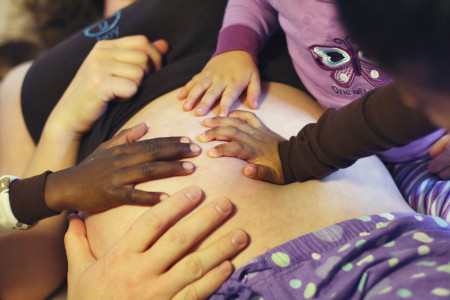So how do you handle it when there are some kids in your family that seem to “fit” physically with you and your spouse and some that don’t? How do you help draw your kids in who may naturally feel a little out?

(Photo by Rebecca Tredway)
One of my favorites from the maternity photos we did before the birth of our youngest
Emphasize what you share. The biggest part is affirming ways that your children are “just like daddy/mommy” wherever you see them. Josh (our African) loves to talk about how when he goes grocery shopping with me he always organizes his little cart so nothing gets squished, just like daddy does (and not at all like me!). We talk about how Danny loves animals and cooking like I do and has a goofy sense of humor just like his dad. And of course with my daughter I talk a lot about how we are the girls and what draws us together that way. We are very intentional about seeing those similarities and pointing them out to our kids. It takes a little extra effort, but it’s good to draw them into your family by pointing out the family resemblances that may be more than skin deep.
Embrace the differences. It’s a necessary part of being a multiracial family to acknowledging and value the parts of your child that are different. I do not like the phrase “color blind”. We are absolutely not blind to the difference that exist. To pretend not to see them would be to act like they are bad things. I come from a Mennonite family and I love that aspect of my history. I want to teach my kids about it because I find it fascinating. I also want to have books about Liberia, about Mexico, about Lakota culture surrounding my kids. We watch movies centered in their history. We have art and dolls and music that reflect their heritage. We love that our kids are different. We aren’t pretending that those differences don’t exist. Josh knows I love his chocolate skin. I tell Danny he has the most beautiful “chokecherry eyes” which is how a lady from his tribe described them because of how deep brown they are—so brown you can’t see his iris. Sometimes Josh will tell me that he can’t eat certain foods because “Liberians don’t like that.” I don’t argue with him too much about those kinds of things. He’ll tell me he doesn’t like the cold, or hates wearing jeans, or is shy in certain circumstances because those are parts of his culture. Maybe he’s right, maybe he’s wrong, but I like to give him some freedom to identify with his history in ways that seem right to him at this point. By opening the door to those conversations, we want him to know that we’re comfortable with talking about whatever is on his mind.
Acknowledge their birthfamily. We have one picture of Josh’s first mom, but even before we did we used to say, “I bet your birthmom has a big smile like you do. I bet you got that from her.” Once we saw that picture of her we knew we were right. Highlighting the ways our kids are beautiful like their birthfamilies is a way to speak positively about them, even if other aspects of who they are are more difficult. It’s a good way to ask questions about the birthfamily and let your child think through the answers. Do you think your birthmom likes spaghetti, too? Do you think you run fast like your birthdad? I wonder if your birthparents were musical like you? Of course, in an international adoption or closed adoption there’s much you won’t know, but it’s a sweet way to bring their birth family into conversation and acknowledge that while this child doesn’t look like you, he does look like somebody. We can say that we’re sure his birthfamily must be beautiful because he sure is.
Laugh. Of course we do sometimes joke about how the kids look like us. While doing my Liberian’s son hair I will say, “This hair is SO curly! Just like mine.” And we both laugh. When people ask if he’s adopted I will sometimes respond, “Yes. How could you tell?” and then put our faces close together. It’s okay within the context of your family and if everybody is on the same page to joke about those topics together. Laughing about it is our way of saying that this isn’t a shameful secret, it’s just our life.
So feel free to embrace the uniquenesses of your kids while also affirming the ways we show that we’re family have much more to do with our values and less to do with how we look.

One Comment
Leave a reply →